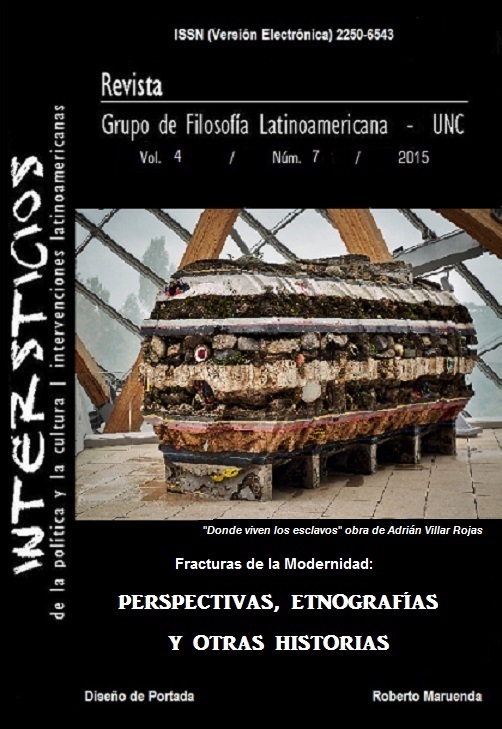Epistemic ruptures: other narratives to (re) think the habitat
Keywords:
Critical epistemology, located knowledge, habitatAbstract
This work intends to engage in dialogue some reflexions coming from the processes of our ongoing research projects related to habitat issues, and the shared discussions within our research team.
On this tour merge uncertainties and questions from the process of theatrical-empirical feedback, that is to say, between diverse habitat experiences and theoretical concepts from authors referring to ideas that recognize other ways of producing knowledge, building arguments outside of those established by the western modern and positivist science in Social Studies.
In this opening process to recognize other voices, customs, traditions and their way of production and reproduction, based on experiences located, an epistemic break is generated with the hegemonic field.
As expressed, we approach the authors allow us to recover the critical to the Modern paradigm, built on a hierarchical relationship of colonial, economic and scientific power; questioning modern conceptions of universality, objectivity and neutrality of knowledge, providing a theoretical device that allows rethink this modern-colonial world system.
Then, we attempt to develop other proposals, from the understanding of the local, in order to address located experiences of housing, from a pluriversal knowledge base and alternative epistemological foundations.
It is from here that we will be outlining and incorporating new theoretical and methodological elements able to contribute to the construction of alternative epistemological frameworks for the Habitat discipline.
Downloads
References
GEERTZ, C. (1994). Conocimiento local. Ensayos sobre la interpretación de las culturas, Paidós, Barcelona
JAMESON, F. (1995). “Lo utópico, el cambio y lo histórico en la posmodernidad”, en CASULLO, N. (Ed). El debate Modernidad-Posmodernidad: edición ampliada y actualizada, Retórica ediciones, Buenos Aires
GROSFOGUEL, R. (2006). “La descolonización de la economía política y los estudios postcoloniales: transmodernidad, pensamiento fronterizo y colonialidad global”, en Tabula Rasa, núm. 4, Universidad Colegio Mayor de Cundinamarca Bogotá, Colombia
LLAMAZARES, A. (2011). Del Reloj a La Flor de Loto. Crisis contemporánea y cambio de paradigmas
DUSSEL, E. (1994) 1492: El encubrimiento del otro: hacia el origen del mito de la modernidad. Plural Editores, La Paz, Facultad de Humanidades y Ciencias de la Educación
LANDER, E. (2000). “Ciencias sociales: saberes coloniales y eurocéntricos”, en LANDER, E. (Comp.) La colonialidad del saber: eurocentrismo y ciencias sociales. Perspectivas Latinoamericanas, CLACSO, Buenos Aires
MIGNOLO, W. (2013). Historias locales/diseños globales. Colonialidad, conocimientos subalternos y pensamiento fronterizo, Edición: Akal, Madrid
CASTRO-GÓMEZ, S. (2007). “Decolonizar la universidad. La hybris del punto cero y el diálogo de saberes”, en El giro decolonial. Reflexiones para una diversidad epistémica más allá del capitalismo global, Siglo del Hombre Editores, cOLOMBIA.
SANTOS, B. de S. (2007) La universidad en el Siglo XXI. Para una reforma democrática y emancipadora de la universidad, CIDES-UMSA, ASDI y Plural editores, La Paz.
SANTOS, B. de S. (2009) Una epistemología del sur: la reivindicación del conocimiento y la emancipación social, Siglo XXI editores, México D.F.
LATOUR, B. (2008) Reensamblar lo social. Una introducción a la teoría del actor red, Ed. Manatial, Buenos Aires
DENZIN, N. y LINCOL, Y. (2005). The Sage Handbook of Qualitative Research. Third Edition. Thousand Oaks: Sage Publications, Inc. Introduction. The Discipline and Practice of Qualitative Research
ESCOBAR, A. (2003) “El lugar de la naturaleza o la naturaleza del lugar: globalización o postdesarrollo”, En: LANDER, E. (Comp.) La Colonialidad del saber: eurocentrismo y ciencias sociales. Perspectivas Latinoamericanas, CLACSO, Buenos Aires.
MIGNOLO, W. (2013). Historias locales/diseños globales. Colonialidad, conocimientos subalternos y pensamiento fronterizo
PEYLOUBET, P. (2010). “Hacia una base cognitiva democrática- debate, construcciones y operacionalización del conocimiento colectivo en el campo del hábitat”, En: Peyloubet, P. (2010) (Comp). Co-Construcción Intearactoral del cocimiento, Nobuko, Córdoba
TOMASI, J. (2011) “Mirando lo vernáculo. Tradiciones disciplinares en el estudio de las “otras arquitecturas” en la Argentina del Siglo XX”, Revista Area Nº 17, Fadu, Uba, Buenos Aires.
Downloads
Published
Issue
Section
License
Authors who have publications with this journal agree to the following terms:
a. Authors will retain their copyright and grant the journal the right of first publication of their work, which will simultaneously be subject to the Creative Commons Attribution License that allows third parties to share the work as long as its author and first publication in this journal are indicated.
b. Authors may adopt other non-exclusive license agreements for distribution of the published version of the work (e.g., deposit it in an institutional telematic archive or publish it in a monographic volume) as long as the initial publication in this journal is indicated.
c. Authors are allowed and encouraged to disseminate their work through the Internet (e.g., in institutional telematic archives or on their web page) after the publication process, which may produce interesting exchanges and increase citations of the published work (see The effect of open access).


